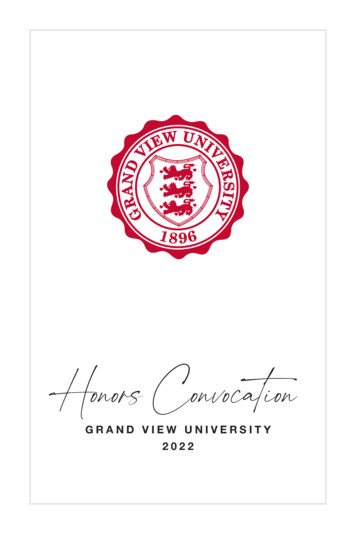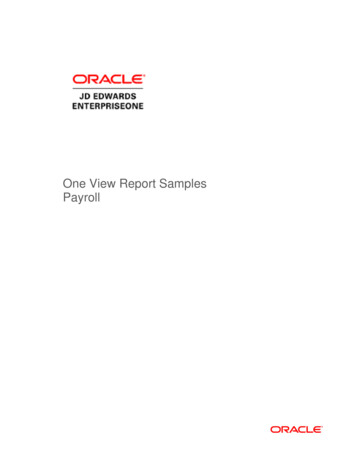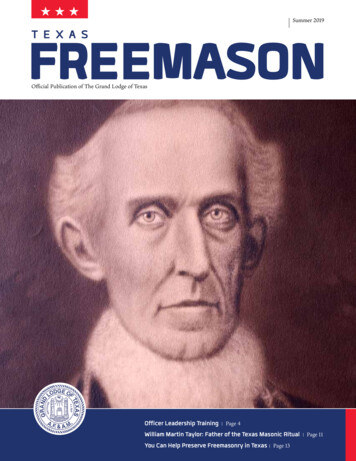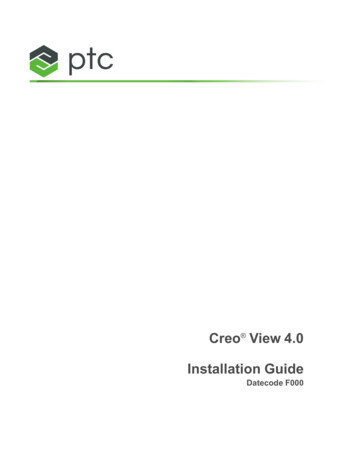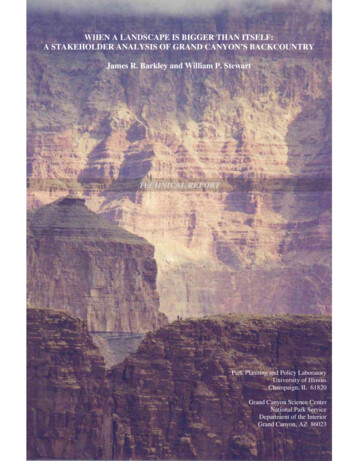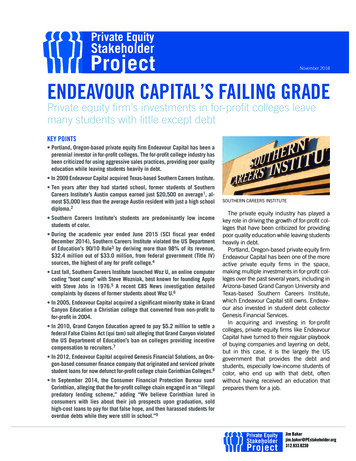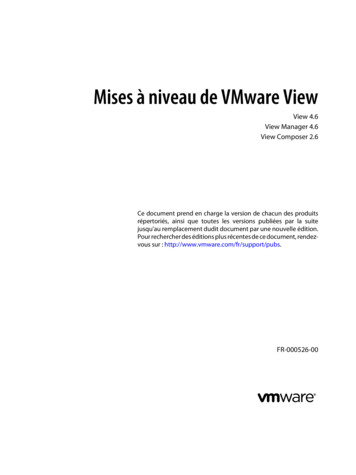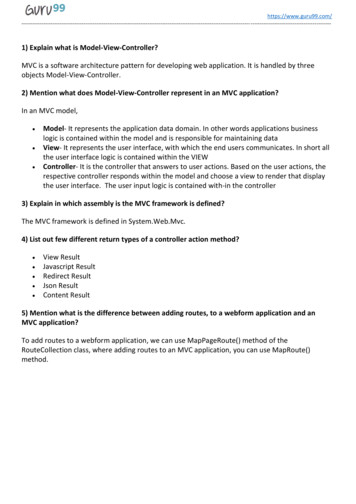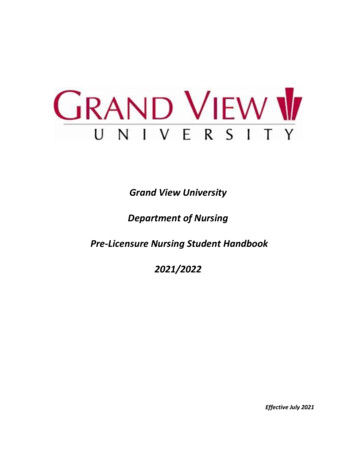
Transcription
Grand View UniversityDepartment of NursingPre-Licensure Nursing Student Handbook2021/2022Effective July 2021
The 2021/2022 Prelicensure Student Handbook contains the policies and procedures for Grand ViewNursing Students and Faculty. It describes the goals to which we aspire. This handbook has beenapproved through appropriate channels and procedures and by Grand View’s Dean of Social and NaturalSciences, Provost and Vice President for Academic Affairs, and the President. Although departmentsmay occasionally wish to publish additional or revised guidelines for certain events and procedures, suchguidelines are not effective and may not be implemented until written approval by Grand View’s Provostand Vice President for Academic Affairs and the President have been obtained.(Department Chair of Nursing)(Dean, College of Social and Natural Provost and Vice President for Academic Affairs)(Date)11/23/2021(President)(Date)
TABLE OF CONTENTSIntroduction . 6Philosophy Statement . 7Program Outcomes and Descriptive Statements. 8Requirements for Admission to the Baccalaureate Nursing Program . 10Procedure for Admission to the Nursing Pre- Licensure Program . 10Licensed Practical Nurses (LPN) . 11Forms Requiring Student Signatures . 13Standard Precautions Education . 13Health Risks Related To Nursing Care Activities. 13Cardio-Pulmonary Resuscitation (CPR) Requirement . 13Annual Student Physical Examination Policy . 13Health Insurance Portability and Accountability Act (HIPAA) Education . 14Professional Liability Insurance . 14Criminal Background and Abuse Registry. 14Nursing Student Expenses . 15Transportation/Travel to Clinical Sites . 15National Student Nurses’ Association (NSNA), Inc. Code of Professional Conduct . 15National Student Nurses’ Association, Inc. Code of Academic and Clinical Conduct . 18Clinical Student Progress Reports. 18Clinical Remediation Policy . 19Clinical Agency Policy. 20Professional Boundaries . 20Patient Confidentiality, Privacy, and Security . 20Civility in the Classroom and Clinical . 20Children and Pets in the Classroom . 21Professional Appearance . 21Procedure for Clinical Absence . 22Mandatory Student Referral for Health Care . 22Student Referral Outcomes Based on Health Care Recommendation . 23Finals Voucher Policy . 23Student Accountability . 23Disciplinary Responses . 24Written Warning and Accountability Contract . 24Student Concerns/Grievance Procedure . 24
Formal Complaint Policy . 25Transfer Credit Evaluation . 26General Guidelines . 26Process . 26Grading in Nursing Courses . 27Progression in the Nursing Major . 27Failed Nursing Courses . 28Individual Program Changes . 28Leave of Absence . 28Program Completion Time Limit. 28Veteran’s Readmission Policy . 28Dismissal from the Nursing Program . 29Readmission to the Nursing Program . 29Honesty Policy . 30Additional Resources . 30Nursing Electronic Portfolios . 30Benchmark Testing . 30Remediation . 30Policy. 31Graduation Petition Procedure . 31Reference Option Form and Summative Graduation Profile . 31Certification for NCLEX-RN (State Boards) . 31Recommendations for students: . 31Guidelines for Application to Take the NCLEX . 32Center for Learning . 33Advisement/Mentoring . 33Grand View University Nursing Student Association (GVNSA) . 34Membership on Standing Committees of the Department of Nursing Faculty . 34Sigma Theta Tau International Society of Nursing Zeta Chi Chapter-at Large . 34Membership Criteria . 34Awards and Scholarships . 35Helen Danielson Scholarship . 35Iowa Lutheran Auxiliary Scholarship . 35Amy Lesher McCleary Scholarship. 35O.E. Ryen Nursing Scholarship . 36
Darleen Sickert Memorial Scholarship . 36Wirtz Scholarship . 36Winifred Van Oel Scholarship . 36Lady-In-White Award . 37health history (Services are available at GV Student Health Services 515-263-2823) . 39CERTIFICATIONs . 39forms. 39Nursing Student Expenses Form . 40Annual Nursing Student Acknowledgment Form . 41Appendix B: Petition for Individual Program Changes Form . 42Appendix C: Finals Voucher Form . 43Appendix D: Disciplinary Response and Forms . 44Table of Disciplinary Responses to Student Behavior Concerns . 44Student Written Warning . 46Student Accountability Contract . 47Appendix E: Release of Information Form . 48Appendix F: Referral for Student to Seek Health Care. 49Appendix G: Reference Option Form . 50Appendix H: Iowa Board of Nursing – Alcohol Related Criminal Offenses . 51
INTRODUCTIONWelcome to the Department of Nursing at Grand View University. This Nursing Student Handbook identifiesexpectations for student responsibility and accountability and serves as an important guide for decision-making. Nursingstudents are responsible for the Handbook content (e.g.) policies and procedures). Signed confirmation of having readthis Handbook is required. Nursing students need to be aware that communications from the Department of Nursing(including new policies and procedures) will be conveyed via the Grand View e-mail system. Nursing students areresponsible for setting up and maintaining a Grand View (GV) e-mail account. If you have not heard from the ITdepartment regarding a GV web mail account, please contact the Information Technology Department at 263-6028.Please do not hesitate to seek clarification of any content you do not understand. We encourage your comments andwish you success in your studies.Grand View UniversityPrelicensure Nursing Student HandbookEach year, students must access their CastleBranch account to upload a document indicating they have read the NursingStudent Handbook policies and procedures.Name:(Please print)Signature:Date:
PHILOSOPHY STATEMENTThe faculty of the Department of Nursing at Grand View University believe that nursing is a discipline whoseprofessionals are grounded in unique caring. We further believe that baccalaureate education is essential forprofessional nursing practice and provides the foundation for graduate nursing education. Caring, the essence ofnursing, is expressed through nurturing of self and relationships between client-nurse, student-faculty, faculty-faculty,and student-student. Caring relationships in nursing are revealed, developed, and discovered through lived experiences.The lived experiences in nursing occur within the context of nursing situations. Well-being is creating and living themeaning of life. The knowledge and understanding derived from nursing situations fosters well-being. Nurses use the artand science of nursing in developing caring responses in the context of caring relationships.Person is viewed as a unique individual who has the potential to care and to be dynamically interconnected with othersand the environment in caring relationships. Within these caring relationships, well-being of clients which includespersons, families, groups, communities, and societies are nurtured.Nursing knowledge and understanding is embedded in practice, embraces theory, and encompasses a variety of ways ofknowing and understanding. Direct patient care is the cornerstone to practice, however, simulation complimentsknowing and understanding, equipping and empowering students to develop clinical reasoning while engaging ininterprofessional relationships. Knowing as well as understanding is shaped by context and interactions with others,with respect for own and other's voice. The learning environment which is a creative and ever-changing caring processemphasizes collegial relationships. The relationships are interactive processes benefiting student, faculty, client, andsociety.Education is a dynamic, creative activity perceived by scholars of caring (Benner & Wrubel, 1989; Boykin & Schoenhofer,1994; Leininger, 1995; Parse, 1981; Watson, 1985). “At its heart, it requires a relationship between teacher and learner,an obligation to impart and receive information. Education does not allow for indifference or denial of responsibility”(Ray, 2010, p. 43). Caring is modeled by establishing environments of learning that provide learners the “opportunity fora caring moment that engages body, mind, and spirit” (Ray, 2010, p. 43). Each learner brings with them the richness oftheir unique culture and modeling, dialogue, practice through multiple ways of knowing (Carper, 1978; Chinn & Kramer,2011; White, 1991).At the completion of the program, the graduate will actualize professionalism by:1. Valuing life-long learning.2. Integrating critical inquiry into practice.3. Nurturing of self and engaging in caring relationships with peers, clients, and society.4. Providing a culturally sensitive continuum of care.5. Empowering self and others to influence health care and society.Philosophy of EvaluationEvaluation is an interactional process between students and faculty regarding nursing situations. The process isaccomplished through reflection of meaning and understanding, seeing present, and future possibilities, and creatingnew ways of being. The evaluation process reflects the interweaving of practical and theoretical knowledge.Initial approval 1996, Revised & approved July 2015 (amended October 2015)7
PROGRAM OUTCOMES AND DESCRIPTIVE STATEMENTSThe graduate will actualize professionalism by:Program Outcome 1: Valuing life-long learning.In the practice of nursing as caring, life-long learning is an ongoing endeavor to seek understanding, meaning, andintegration of lived experiences into a new way of being. The endeavor is dynamic and includes critical thinking andmultiple ways of knowing. Examples include, but are not limited to:professional contribution to others’ learningscholarshipwritingdialogueinvolvement in researchevidence-based practicecollaborationcollegial caringheightened sense of selfbeingpresencescholarly reciprocityreading professional journalsprofessional socializationongoing educationProgram Outcome 2: Integrating critical inquiry into practice.Critical inquiry is a composite of attitudes and ways of considering knowledge. In the practice of nursing, critical inquiryis used to develop meaning and understanding as well as to see present and future possibilities through interpretationof both the nurse’s and client’s lived experiences. Examples include, but are not limited to:observationreflectioncreativitydirected thinkingevidence-based practiceacquisition of empirical and practice knowledgecritical social interactionsynthesisuse of a clinical decision-making trailProgram Outcome 3: Nurturing of self and engaging in caring relationships with peers, clients, and society.Caring relationships among clients, faculty, students, and nurses are the foundation for the practice of nursing. They areways of relating that provide opportunity to develop both person’s caring potential and possibility. Specifically, in caringrelationships within nursing situations, the clients and student seek meanings of the client’s well-being. Within thiscontext clients and students are transformed. Caring relationships are unique to the persons involved and evolvemoment to moment. Caring relationships evolve from caring responses such as:presenceseeking meaningimaginingopenness to new ways of beingcenterednesschoicesmultiple perspectives of knowingtheoretical basis of tyself-understandingclinical singtouchProgram Outcome 4: Providing a culturally sensitive continuum of care.Culturally sensitive care is a set of congruent interactions, behaviors, values, attitudes, and policies that come togetherin community and foster caring relationships. Culturally sensitive care could include but is not limited to:8
sensitive interactions with diverse culturessearch for and obtaining educational foundations regarding various worldviewsengaging directly in cross-cultural interactions demonstration of caring responses in interactions with diverse cultures.self-discoveryenculturation into nursingProgram Outcome 5: Empowering self and others to influence health care and society.In the practice of nursing as caring, nurses empower themselves and others. Empowerment involves influencing policythat affects nursing, health care, and society. Examples include, but are not limited to:colleagueshipresearch utilizationpolicymakingpolitical activity (such as networking, lobbying, testifying at hearings)professional organization involvementadvocacyevidence-based practice*social responsibilityinfluencing health outcomes*Definition of Evidence-Based PracticeEvidence-based practice (EBP) is a process by which nurses and health care professionals make clinical decisions usingthe best available research evidence, their clinical expertise, and patient preferences, within the context of availableresources.EBP is reflective and embraces multiple patterns of knowing, philosophy, theory, critical thinking, and integration ofresearch driven information.9
STUDENT ADMISSION TO THE NURSING PROGRAMThe Department of Nursing abides by the non-discrimination policy of the University. The applicant must be admitted toGrand View University before being eligible to be admitted to the Department of Nursing.REQUIREMENTS FOR ADMISSION TO THE BACCALAUREATE NURSING PROGRAMThese requirements will apply to all applicants to the major regardless of the catalog year of admission to theuniversity. Scholastic Ability – must have a minimum cumulative GPA of 3.0 to be admitted to Nursing. If transfer GPA is 3.0, students can meet the GPA admission requirement by completing a cumulativeGPA of 3.0 on a minimum of 12 Grand View credits. Must have completed English 101, Biology 256, and Chemistry 107 with at least a grade of C. Must achieve 80% or greater on the following two REACH A2 Examinations: Reading Comprehension and BasicMath Skills. Students will receive the Pre-Admission Examination Procedure after receipt of their application tothe nursing major. If any of the A2 scores are less than 80%, the applicant may retake version two (V2) of the appropriateA2 examination. The applicant is allowed only these two attempts to achieve scores of 80% or above onthe A2 examinations. Highly recommended to complete Math 095 or Math 121 and PSYC 101.Students who have been enrolled in a nursing program elsewhere must show evidence they left their previous nursingprogram in good standing. This requires that a letter from the director of their previous program (Dean, Chair, orDepartment Head) be sent directly to the Grand View University Nursing Department Chair confirming good standing.Students who cannot provide evidence of good academic standing (e.g. was not dismissed from program, is notprohibited from returning to the nursing program, etc.) will not be considered for admission to Grand View’s BSNprogram.PROCEDURE FOR ADMISSION TO THE NURSING PRE- LICENSURE PROGRAMComplete the nursing application and return them along with any other requested information to the Department ofNursing: Pre-Licensure Nursing Program Application: Please complete the application to the program found on theadvising tab on myView. Processing of Application: All information needed for the applicant file must be received before the NursingAdmissions, Progression, Graduation and Scholarship Committee (APGS) considers the applicant for entry intothe program (i.e. nursing application, transcripts, etc.). The APGS Committee is composed of a chair, who is amember of the nursing faculty, additional nursing faculty, representatives of University admissions, theUniversity for Professional and Adult Learning (CPAL) program, the Nursing Administrative Assistant, andstudent representatives. The APGS Committee considers all qualified applicants to the nursing program.Nursing courses with a clinical component may not be taken by a person:a. Who has been denied licensure by the Iowa Board of Nursing.b. Whose license is currently suspended, surrendered or revoked in any U.S. jurisdiction.c. Whose license/registration is currently suspended, surrendered, or revoked in another country due todisciplinary action.10
LICENSED PRACTICAL NURSES (LPN)LPNs who have graduated from a post-secondary practical nursing program may apply to the Department of Nursing.Requirements for LPN Admission to the Pre-licensure Nursing Program Admission requirements and process is the same as for pre-licensure. Licensed as an LPN in the state of Iowa. A copy of the license should be sent to the Nursing AdministrativeAssistant. The LPN will follow the same course requirements as any pre-licensure nursing student.11
POST-ADMISSION REQUIREMENTSThe Department of Nursing maintains contractual agreements with clinical practice agencies throughout central Iowa.These agencies have specific requirements associated with regulatory or accreditation bodies. Students are asked tomeet the requirements related to these contractual agreements. Requirements may be updated as needed to fulfill thecontractual requirements of clinical locations. Grand View University nursing students must provide routine verificationof the requirements prior to any clinical or laboratory experiences.Grand View University uses CastleBranch for electronic data management of these requirements which includeimmunizations, CPR certification, professional liability insurance, as well as other Department of Nursing specificrequirements (see Appendix A for Post-Admission Checklist and Form).In general, the following tasks are required for all nursing students. Please refer to CastleBranch.com and Appendix A forthe applicable forms with specific requirements and due dates:UPON ADMISSION TO NURSING PROGRAM: Vaccinations – MMR, Varicella, Hepatitis B, Polio, Tdap/Td, influenza, coronavirus TB test Physical Examination Standard Precautions Education form Health Risks Related to Nursing Care Activities form CPR certification Professional liability insurance Mandatory reporter for dependent adult and child abuseANNUALLY THEREAFTER AND/OR AS ITEMS EXPIRE: Influenza vaccinationCoronavirus vaccinationTdap/TdNursing Student Handbook acknowledgement formPhysical ExaminationStandard Precautions Education formCPR certificationProfessional liability insuranceMandatory reporter for dependent adult and child abuseHIPAA training (via CastleBranch)Students will need to access their CastleBranch account to download, sign, and reupload documents indicating theyhave completed the clinical requirements. Each semester students need to demonstrate compliance with clinicalrequirements. Compliance is monitored by Center for Learning staff. Any requests for exemptions should be submittedto the Nursing Department Chair.12
FORMS REQUIRING STUDENT SIGNATURES*See Appendix A for printable formsSTANDARD PRECAUTIONS EDUCATIONBecause nursing students may have direct contact with blood and other body fluids, Grand View University Departmentof Nursing requires education in Standard Precautions. This education is an annual requirement. Verification ofeducation received as a requirement for employment will be accepted in lieu of this education.HEALTH RISKS RELATED TO NURSING CARE ACTIVITIESNursing students may be exposed to infectious diseases such as Hepatitis B, Human Immune Deficiency Virus (HIV),Tuberculosis (TB), coronavirus, or other infectious/ communicable diseases during care giving activities with people.Nursing students are also at risk for injuries during care giving activities including needle stick injuries and back injuries.The Department of Nursing mandates learning opportunities which assist students to identify risks and reduce exposure,such as standard precautions training, and it has instituted safeguards such as immunization requirements to assiststudents in reducing health risks and in preventing injuries.In order to reduce risk to my health as a nursing student, I understand it is my responsibility to inform the Departmentof Nursing and the University Health Nurse of changes in my health status such as pregnancy, contraction of acommunicable or infectious disease, or any injury that could affect my performance as soon as possible. In the event ofan injury during clinical, the agency (where the practicum is occurring) policy will be followed.I understand that, as a nursing student, I may be exposed to hazardous drugs that can cause both acute and chronichealth effects such as skin rashes, adverse reproductive outcomes (including infertility, spontaneous abortions, andcongenital malformations), and possibly leukemia and other cancers. Furthermore, I have watched the following videos(What is USP 800 What are the risks to nursing?), understand the risks to working with hazardous drugs, and I amaware of step that I need to take to protect myself and the people I am working with.I understand that testing, diagnosis, and treatment of any infectious/ communicable disease or injury including thoseincurred or contracted while acting as a caregiver in my clinical experiences with Grand View University Department ofNursing will be paid for at my own expense. I understand that I am ex
Welcome to the Department of Nursing at Grand View University. This Nursing Student Handbook identifies expectations for student responsibility and accountability and serves as an important guide for decision-making. Nursing students are responsible for the Handbook content (e.g.) policies and procedures). Signed confirmation of having read

